Knowledge Management System
In any organization, there's significant and worthwhile information available everywhere. This information can be turned into knowledge and when this knowledge is published systematically, it could become a major source of business growth.
WATCH OVERVIEWWhat is a knowledge management system?
A knowledge management system is a system that is designed to facilitate sharing and integrating knowledge. It acts as a storehouse to collect, organize, analyze, and re-use knowledge that would otherwise be scattered across the organization.
How can a knowledge management system serve as a powerful tool to boost customer support?
Picking up the phone to call customer support is no longer people's go-to option when facing issues with a product. These days customers go through a company's website first and try to fix things by themselves. They want to avoid waiting for days to get the issue fixed and look for instant solutions. The best way to meet this growing expectation is to maintain a knowledge base portal as part of your company's website.
In the knowledge base, you can post how-to videos, write step-by-step guidelines, publish articles with screenshots, answer commonly faced problems, highlight FAQs in the customer support portal, and provide a platform for writing feedback and reviews. This greatly impacts your brand image as a web-savvy performer and improves customer loyalty.
What are the benefits of having an enterprise knowledge management system in place?
- Businesses want happy customers.
- Customers want readily available solutions to their problems.
- Support Agents want to work an optimized support process.
Setting up a knowledge management database makes all these aspirations achievable.
- FOR SUPPORT AGENTS
- FOR CUSTOMERS
- FOR BUSINESS
Reduced ticket volume
A knowledge management database is made up of useful information and resources. Hence, navigating to the knowledge base through a self-service portal directly reduces the number of support tickets agents receive every day. Customers can find the answers to their own questions making it unnecessary for them to submit a ticket for most of the problems they face.
Zero redundant effort
A knowledge management system with help articles and user manuals makes agents' problem-solving efforts re-usable. When an agent finds a new solution, it can be added to the system for other customers to find. As a result, customers submit tickets only for real issues that demand agents' help. This streamlines the agents' work by eliminating the duplication of effort.
Optimized service and improved productivity
Customers get redirected to your knowledge management solutions through a self-service portal. This enables agents to optimize their efforts to improve the resolution rate for complex issues and build meaningful customer relationships by helping customers resolve difficult problems.
Availability of 24-hour support
An online customer portal powered by a robust knowledge management system provides customers with all the relevant information whenever they want. This prevents them from going through the traditional process of customer support like writing an email or creating a ticket. It enhances customer satisfaction through ready-made results.
Stimulated innovation and skills
With step-to-step guides, DIY videos, images, screenshots the self-service portal gives customers a chance to try new things and build their own tools. The portal also serves as a platform where customers can learn more about a company's product suite.
Improved CX
Customer satisfaction improves when customers can find solutions quickly by browsing through the FAQs and resolving an issue by themselves. The more customers collaborate with others in the same community, the more likely it is for them to feel a great overall support experience. A customer portal is a one-stop spot for such positive customer interactions and valuable content.
Lowered support costs
With your customers finding answers on their own and your support agents no longer spending time and effort on repetitive customer queries, an online knowledge management system reduces support costs and improves customer engagement. Keeping the knowledge base content up-to-date even boosts web traffic to your company's website.
Increased customer retention
An effective knowledge base as a part of your company's website and a community forum for your customers to discuss ideas can greatly improve customer loyalty. It helps in building meaningful relationships with your customers, reducing the customer churn rate.
Positive recommendations
Accessing meaningful and relevant information, and participating in an online community allows your customers to use your product or service to the fullest. The enriched customer experience impacts customer loyalty and guarantees glowing customer recommendations.
FOR SUPPORT AGENTS
Reduced ticket volume
A knowledge management database is made up of useful information and resources. Hence, navigating to the knowledge base through a self-service portal directly reduces the number of support tickets agents receive every day. Customers can find the answers to their own questions making it unnecessary for them to submit a ticket for most of the problems they face.
Zero redundant effort
A knowledge management system with help articles and user manuals makes agents' problem-solving efforts re-usable. When an agent finds a new solution, it can be added to the system for other customers to find. As a result, customers submit tickets only for real issues that demand agents' help. This streamlines the agents' work by eliminating the duplication of effort.
Optimized service and improved productivity
Customers get redirected to your knowledge management solutions through a self-service portal. This enables agents to optimize their efforts to improve the resolution rate for complex issues and build meaningful customer relationships by helping customers resolve difficult problems.
FOR CUSTOMERS
Availability of 24-hour support
An online customer portal powered by a robust knowledge management system provides customers with all the relevant information whenever they want. This prevents them from going through the traditional process of customer support like writing an email or creating a ticket. It enhances customer satisfaction through ready-made results.
Stimulated innovation and skills
With step-to-step guides, DIY videos, images, screenshots the self-service portal gives customers a chance to try new things and build their own tools. The portal also serves as a platform where customers can learn more about a company's product suite.
Improved CX
Customer satisfaction improves when customers can find solutions quickly by browsing through the FAQs and resolving an issue by themselves. The more customers collaborate with others in the same community, the more likely it is for them to feel a great overall support experience. A customer portal is a one-stop spot for such positive customer interactions and valuable content.
FOR BUSINESS
Lowered support costs
With your customers finding answers on their own and your support agents no longer spending time and effort on repetitive customer queries, an online knowledge management system reduces support costs and improves customer engagement. Keeping the knowledge base content up-to-date even boosts web traffic to your company's website.
Increased customer retention
With step-to-step guides, DIY videos, images, screenshots the self-service portal gives customers a chance to try new things and build their own tools. The portal also serves as a platform where customers can learn more about a company's product suite.
Improved CX
Customer satisfaction improves when customers can find solutions quickly by browsing through the FAQs and resolving an issue by themselves. The more customers collaborate with others in the same community, the more likely it is for them to feel a great overall support experience. A customer portal is a one-stop spot for such positive customer interactions and valuable content.
What are the essential features of a knowledge management system?
A knowledge management system or a knowledge base should be well-designed and user-friendly. So, how do you create a knowledge base which is an effective knowledge sharing resource and also a space to get inventive?
Take a look at the "must-have" features of a knowledge management tool.
Portal customization
Branding is pivotal when you use a knowledge management system. Incorporating your brand's logo and color scheme in your support portal makes it a cohesive part of your brand, creating a seamless customer experience. You must also ensure that the knowledge management tool that you prefer allows you to import media and rich text to your articles.
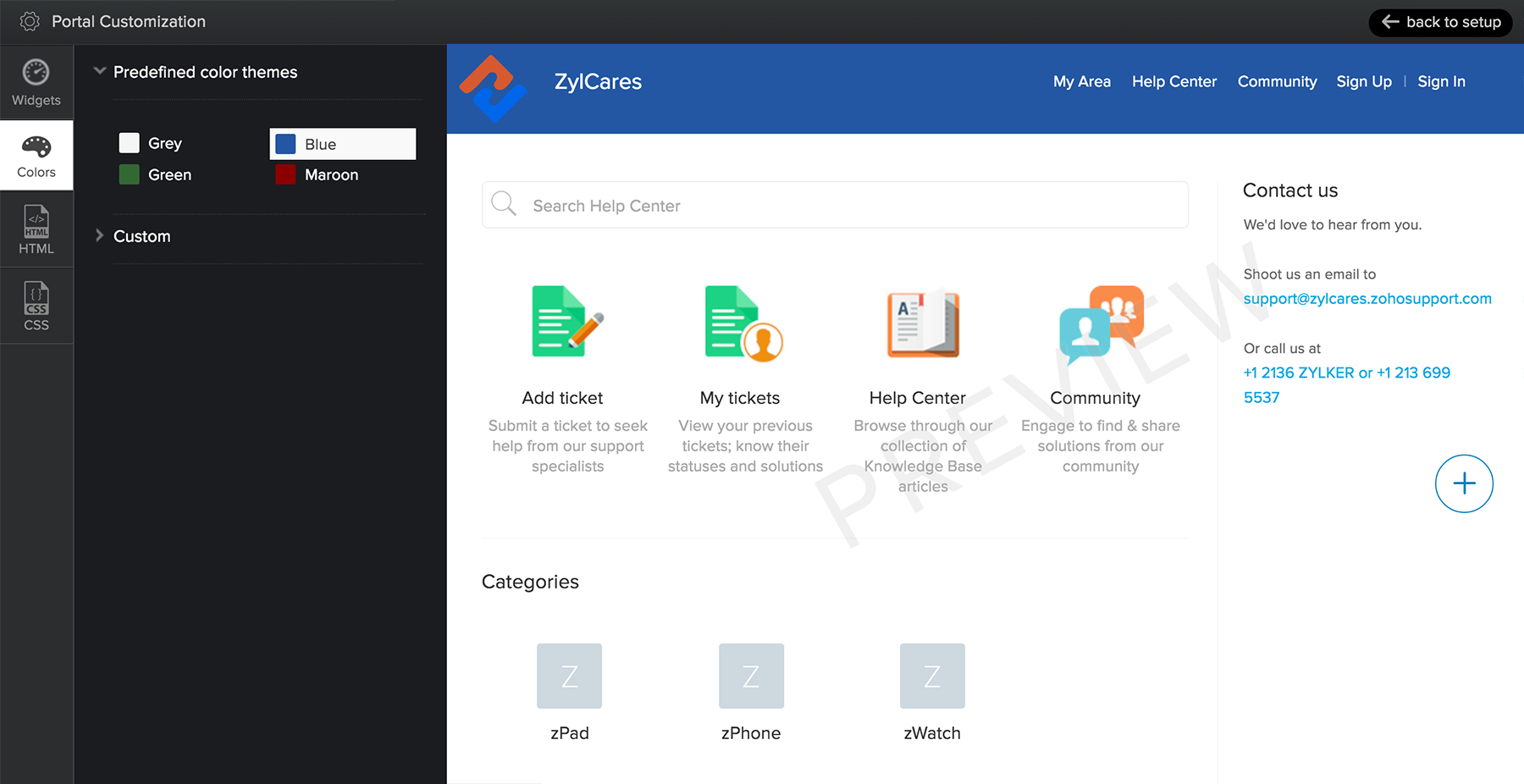
Domain mapping
The knowledge management system is nothing but an extension of your company's website. Efficient knowledge management software enables you to make your help portal part of your brand by mapping it to your own domain.
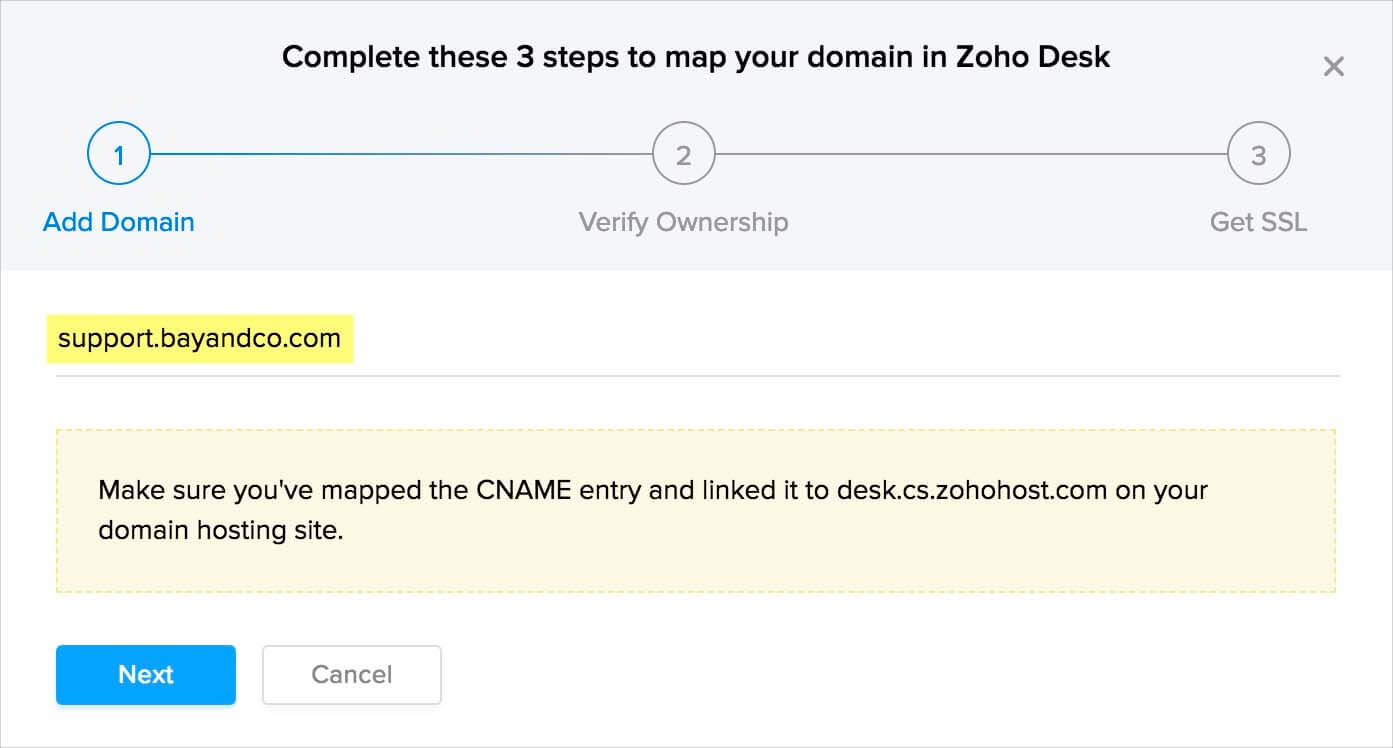
Secure access
You simply cannot let any employee publish a help article or let anyone navigate to your support portal. Choose a knowledge management system that empowers you to take control of publishing and viewership permissions. This helps you put a proper editorial process in place and get the right audience in.
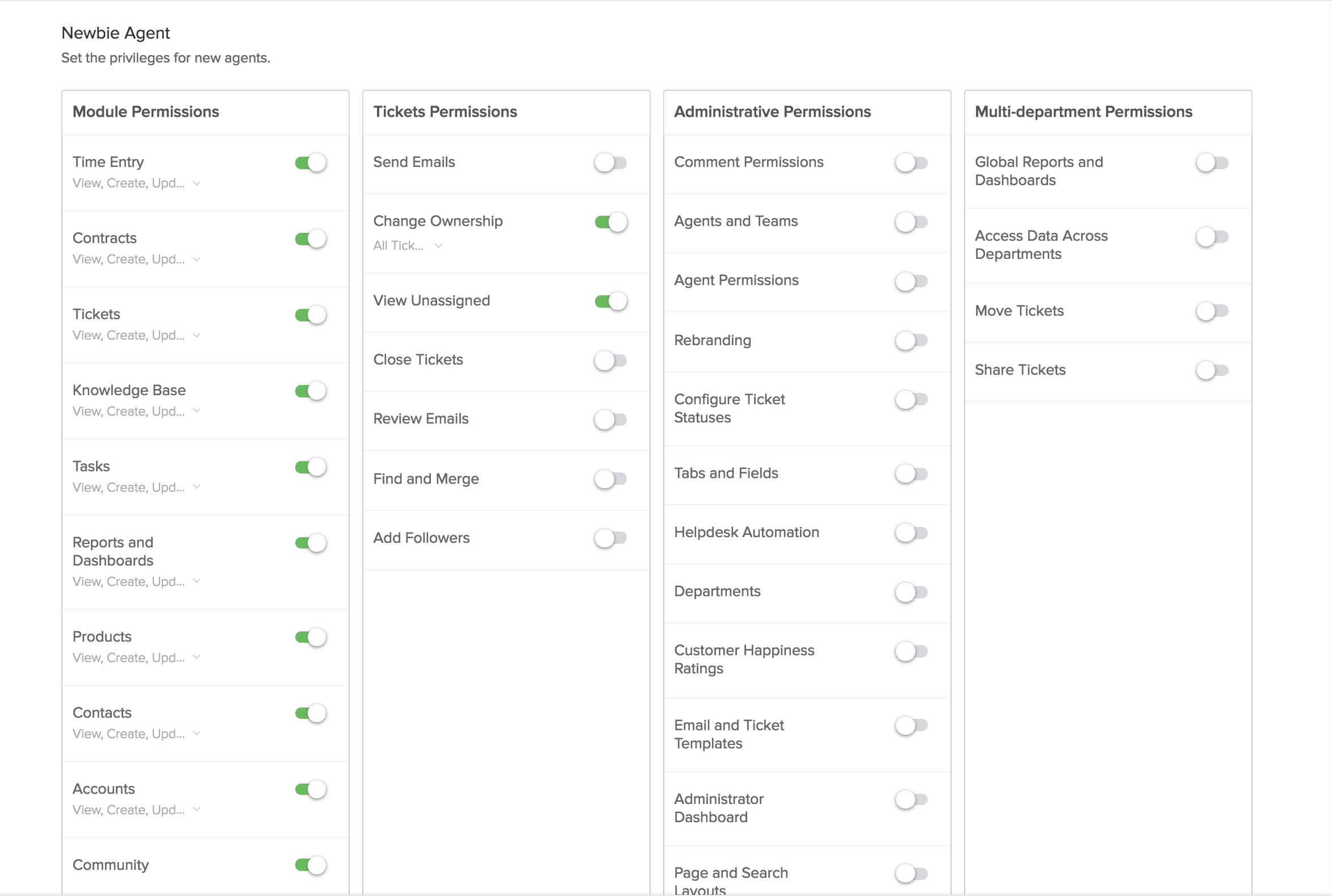
The repository of articles
Share your support agents' knowledge with your customers through the customer self-service portal. Publish valuable content in the form of help articles and FAQs. This helps you build a knowledge repository with loads of relevant and educational information that can be useful for both your employees and your customers.
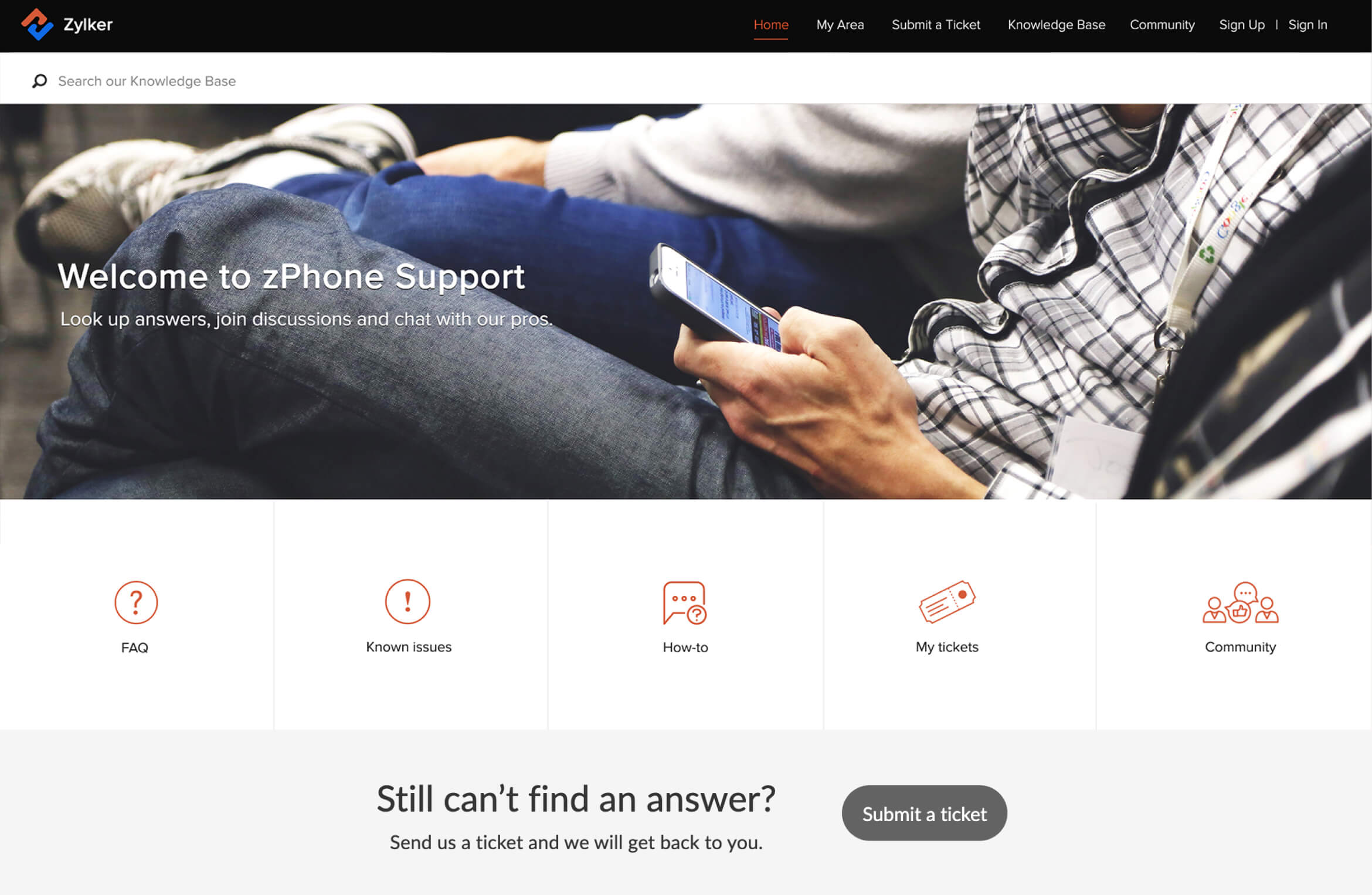
Forums and Community
Enable your customers to engage in discussions with each other and with your company. With Communities and forums facilitated inside your self-service portal, customers can ask and answer questions and share ideas on a common platform. This helps your customers to trust your brand more and improves their over all experience.
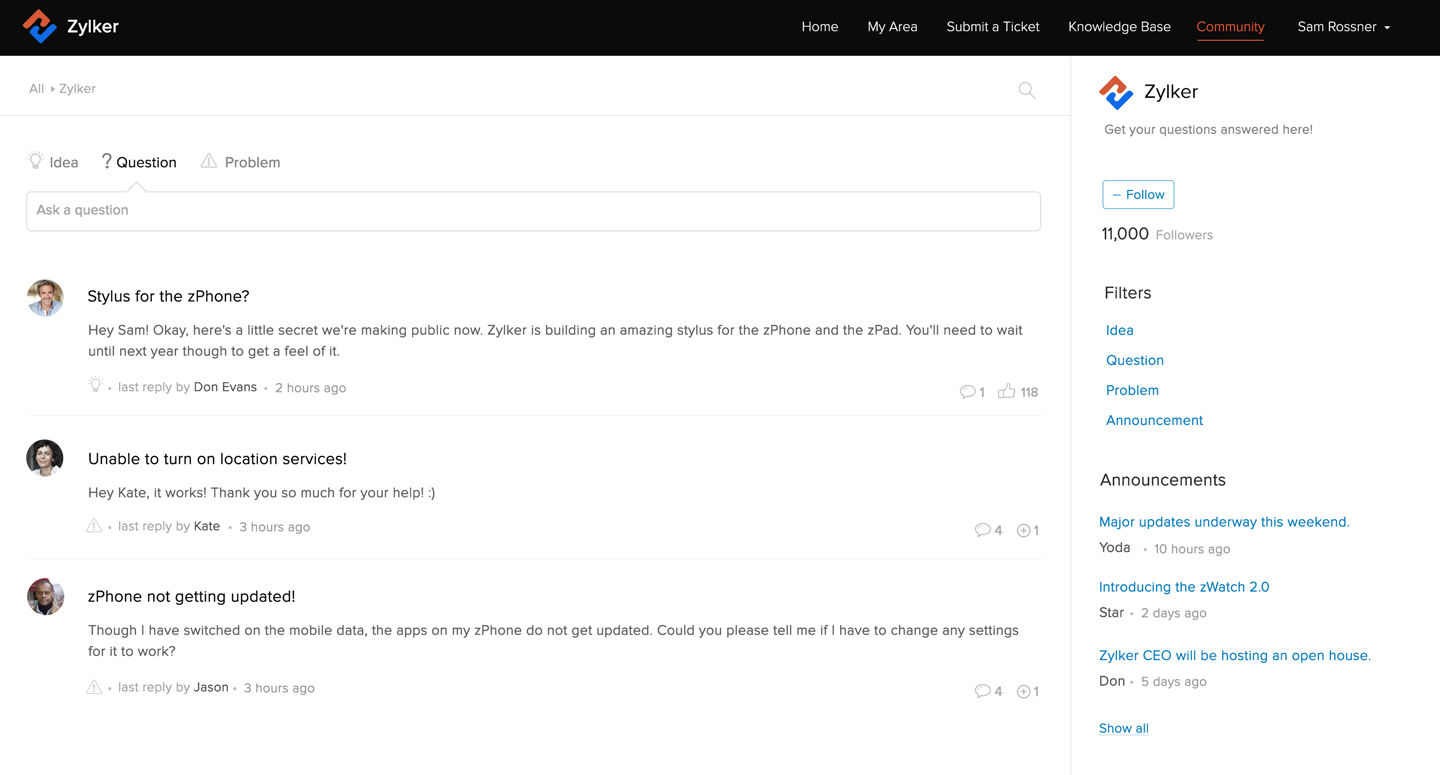
Industry's best Knowledge Management system.
Zoho Desk's knowledge management software is known for the built-in setup of a customizable multi-brand help center and a multi-lingual Knowledge Base. It serves as a platform to manage and share knowledge online in a way that is beneficial for both customers and businesses.
Advanced Help Center Customization
The advanced customization options from Zoho Desk's Knowledge management software bring you HTML and CSS (cascading style sheets) to help you make your Help Center look just like an extension of your company's website. Web-savvy Zoho Desk administrators can directly work on the Help Center's HTML and customize the site's CSS to fit your requirements.
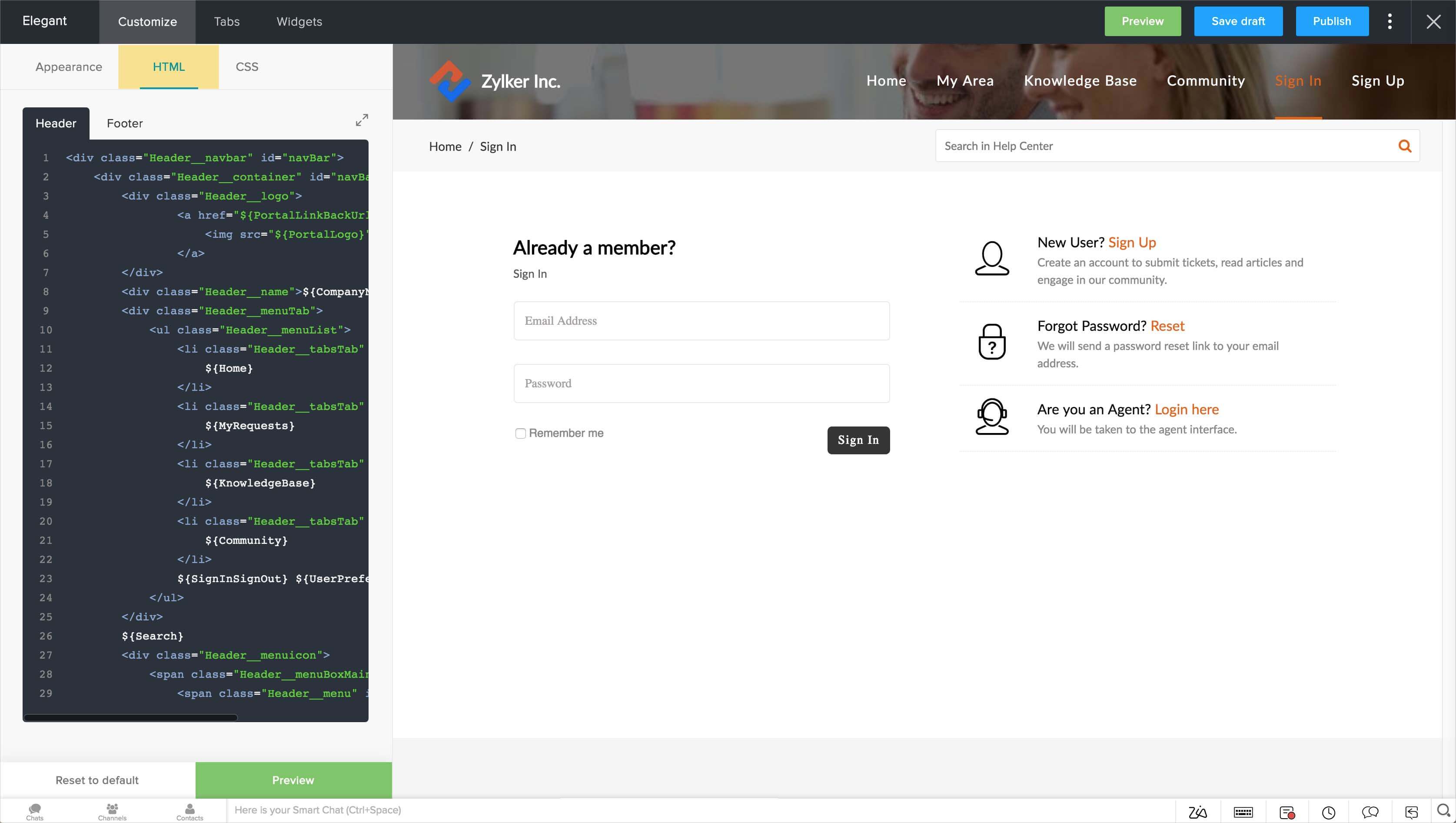
Direct ticket submission
After going through the help center, a customer may still have issues that need personal attention. Zoho Desk's knowledge management software makes it easy for them to submit tickets directly from the Help Center. They can also track their tickets' statuses from the same interface.
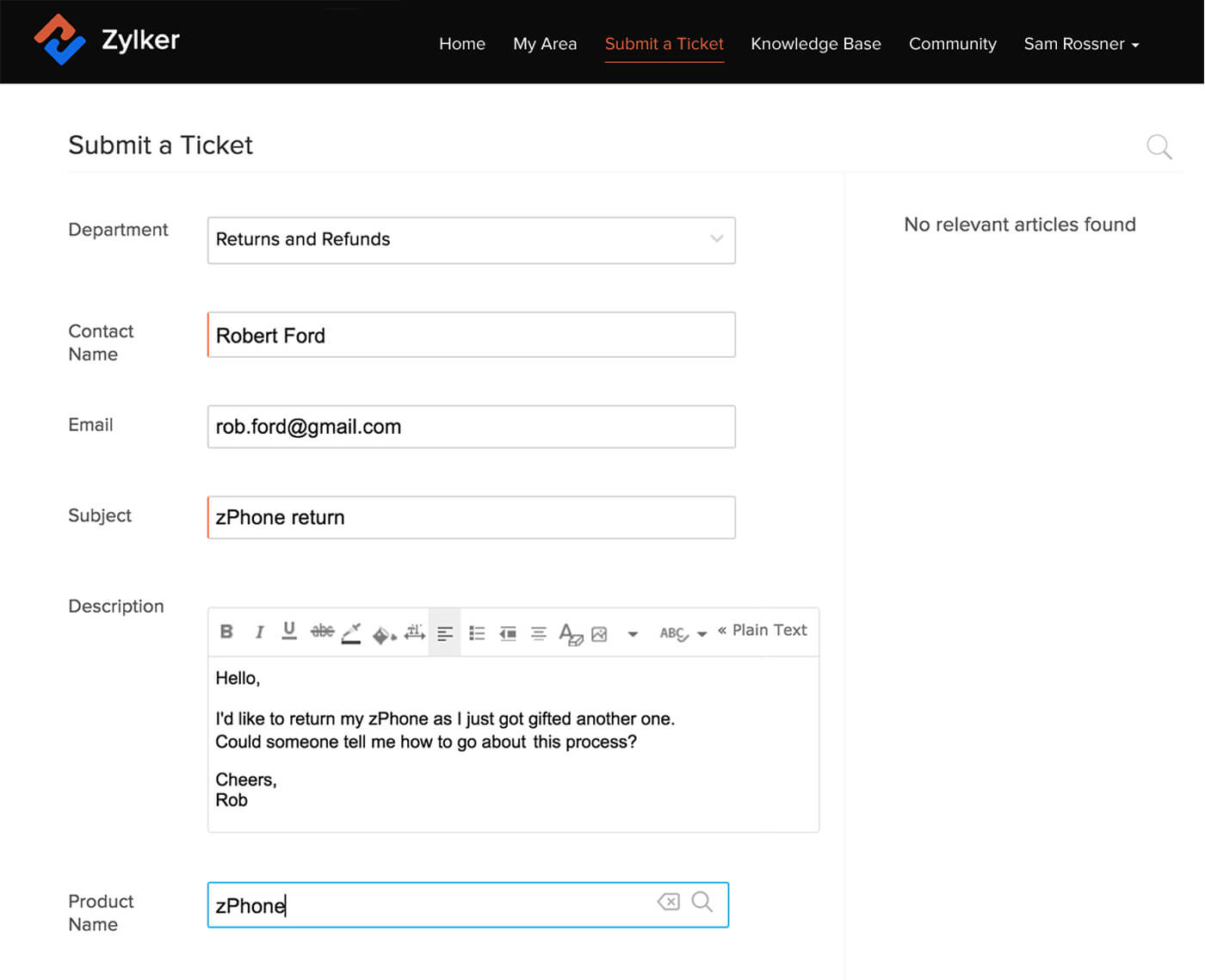
Auto-suggest
The articles published in the Knowledge Base come in handy for support agents when they work on tickets. This feature from Zoho Desk's knowledge management tool pulls up relevant articles from the knowledgebase based on keywords in the ticket. Agents can now simply paste the article or link to it in their response.
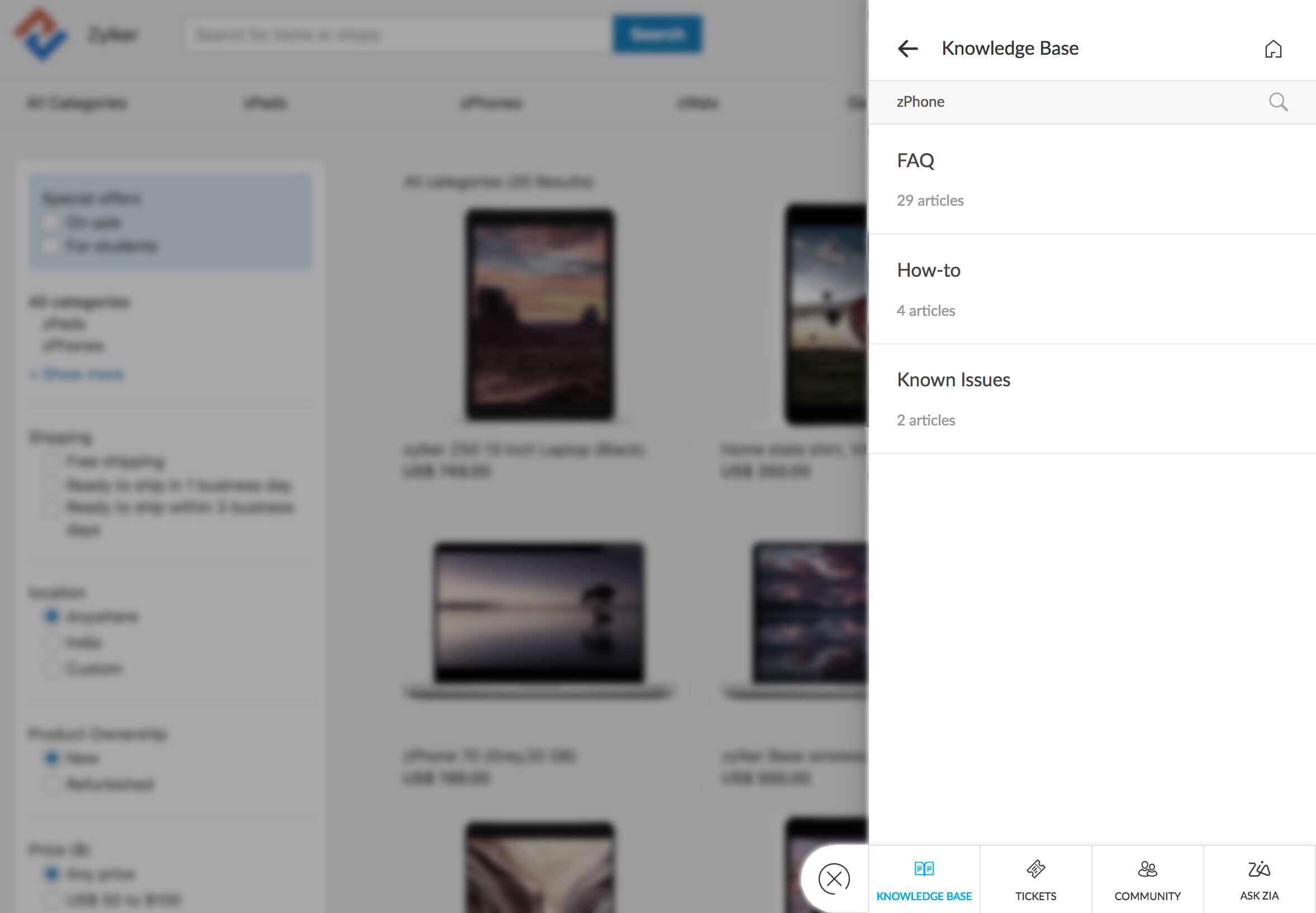
SEO friendly
Having great help center content is only useful if it ranks well on search engines. Zoho Desk's SEO-friendly free knowledge management system makes this process uncomplicated and ensures your customers end up in the repository that you've created for them. Using meta titles, keywords, and description, Zoho Desk makes your support pages easy for search engines to locate.
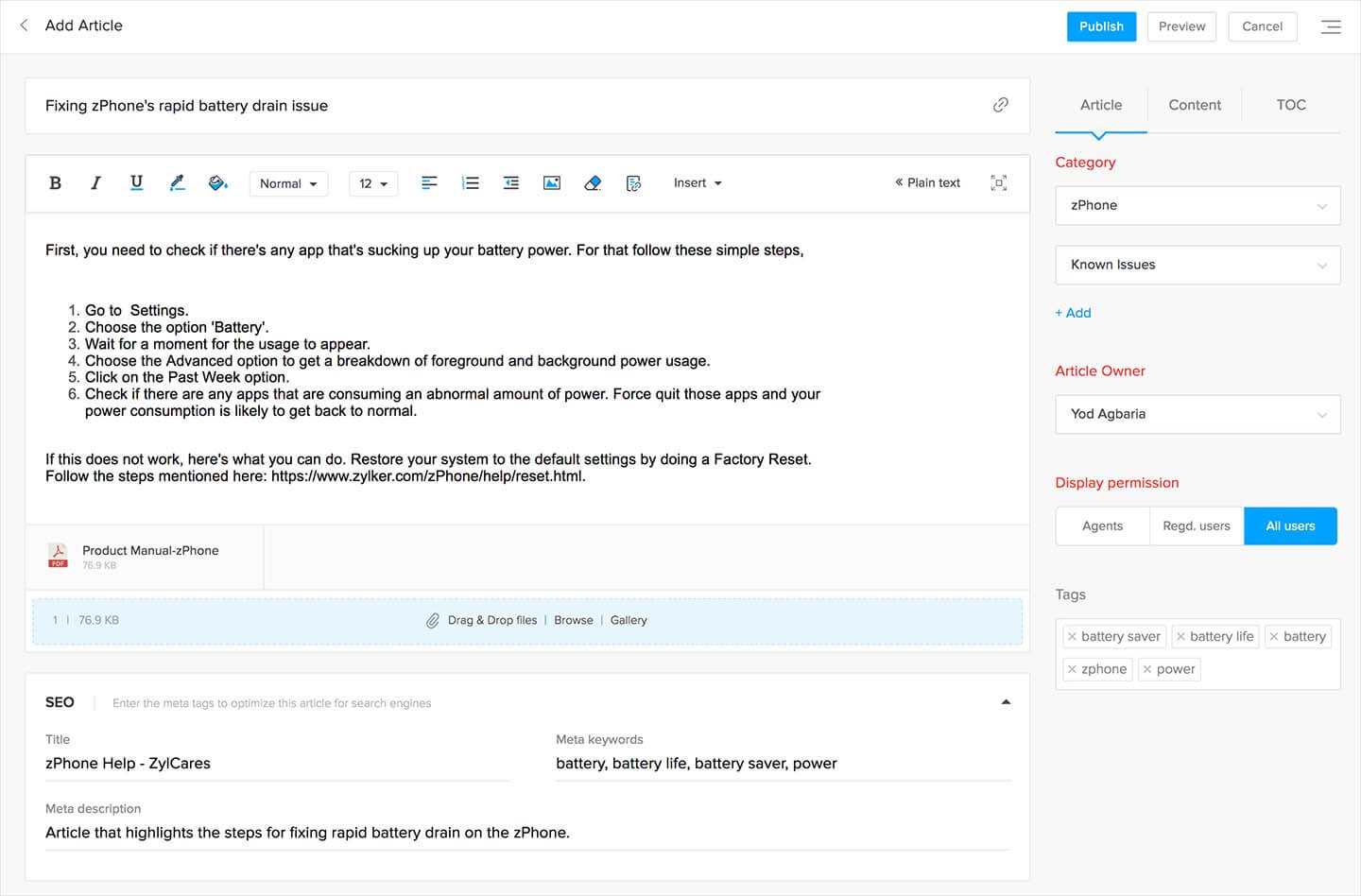
Help Center reports and insights
Zoho Desk's online knowledge management software comes with built-in reports to monitor the customers' self-service behavior and engagement levels. You can also create your own dashboards just as easily. Zoho Desk's help center can also be integrated seamlessly with Google Analytics to help you track and trend how your customers are interacting with your Help Center.
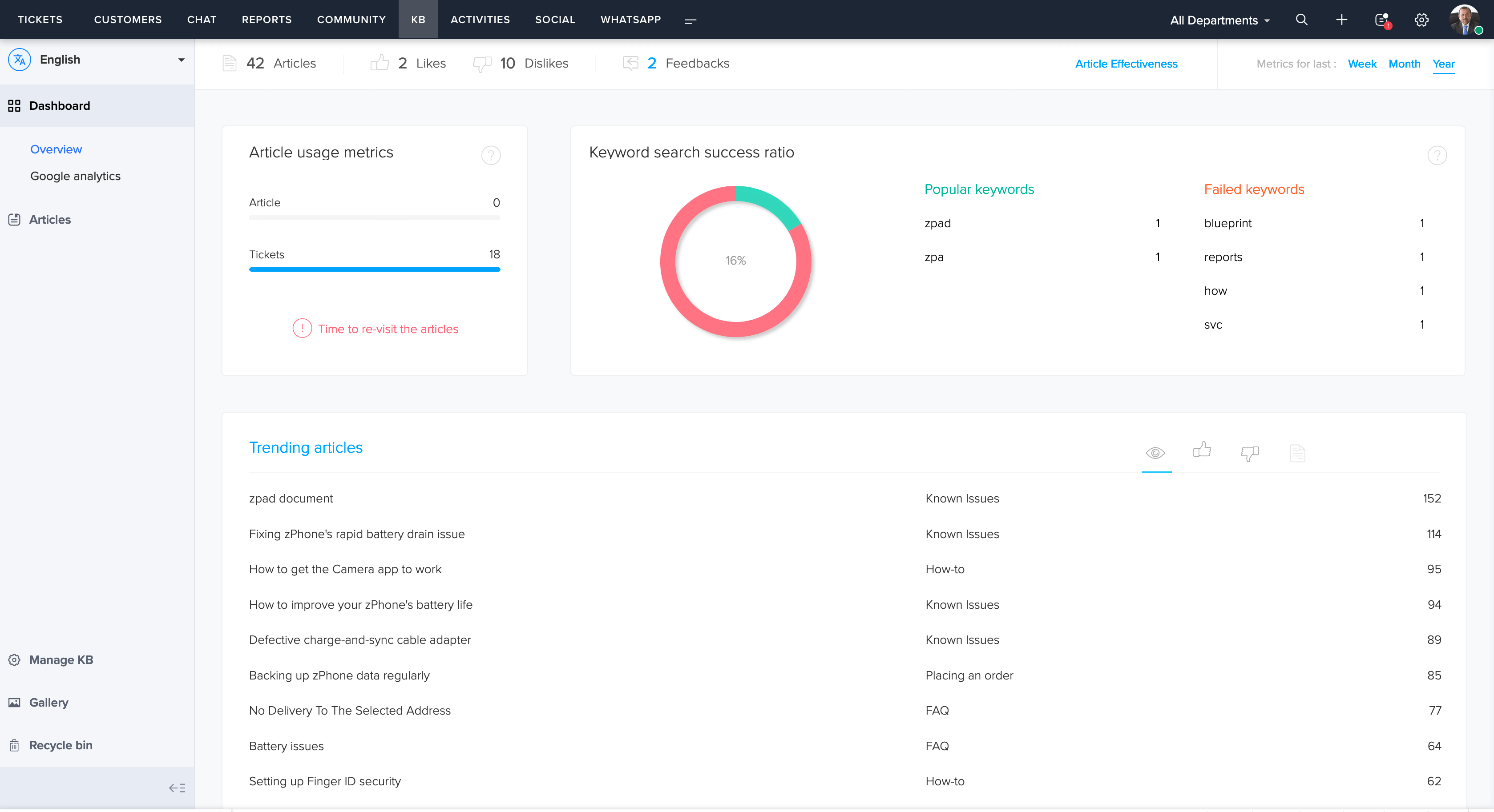
What if you're not satisfied with the knowledge management software after buying it?
Most knowledge management tools, including Zoho Desk, offer a trial period. Evaluate, compare, understand, then decide. You can even evaluate and compare Zoho Desk with its competitors, and take a look at pricing plans before you make a decision.